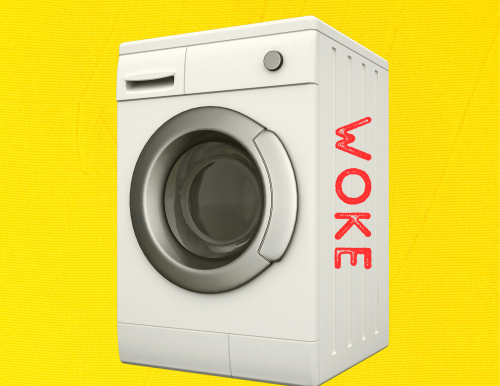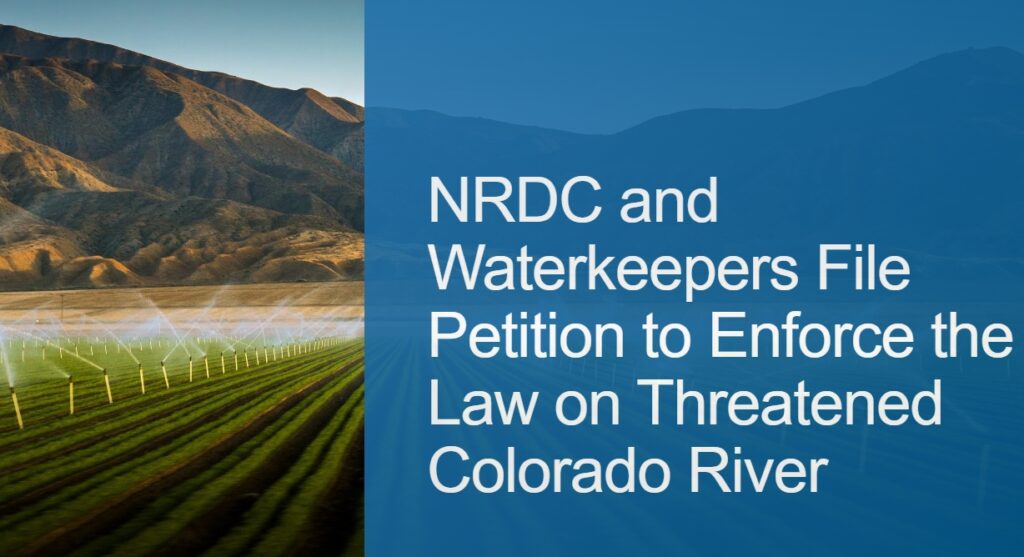The Good, the Bad and the Utter Contempt
The Drain is a weekly roundup of climate and environmental news from Legal Planet.

The news this week has me remembering my grandpa teaching a young me to turn off the tap while brushing my teeth. (Hey, I was an ignorant East Coast kid.) This was in California’s Central Valley around 1990 when drought conditions flared and the federal government cut water deliveries.
What was the news story? What if I told you there is a popular government program that costs less money to run than it saves American consumers on their utility bills? Oh, and this effective government program — with years of bipartisan approval, mind you — is able to cut pollution by working collaboratively with the private sector on a voluntary system rather than regulating it.
In a galaxy where logic prevails, this model program does its thing without us ever having to think about it again. But in 2025, everything must be re-litigated. So, the Trump administration is killing the Energy Star program — that handy, blue-sticker certification that tells you whether a fridge, dishwasher or other home appliance is energy efficient. Trump’s EPA is killing Energy Star because it is climate-related. Lisa Friedman and Rebecca Elliott report for the New York Times that the 33-year-old program, which was started under George H.W. Bush (around the time I was learning to brush teeth with less water), has helped households and businesses save more than $500 billion in energy costs and to get rebates and tax credits.
Encouraging manufacturers to make products that use less power means that we can do more with less.
If we were really in an “energy emergency,” we would not kill a cost-efficient program that helps us conserve. My rock-ribbed Republican grandfather — the youngest of 7 children who grew up in Utah during the Great Depression, who would re-use napkins like his life depended on it — would be horrified at this utter contempt for conservation. Meanwhile, we are truly facing an energy affordability crisis, and contempt for sound policy could make Republicans lose that debate.
Here’s what else I see this week…
Good news
Science! Two important scientific societies, the American Meteorological Society and the American Geophysical Union, announced they will fill the gaping hole left by the Trump Administration abandoning the National Climate Assessment and dismissing the scientific experts who put it together.
Electricity! For the first time, fossil fuels provided less than half of U.S. electricity generation for a whole month — March 2025 — thanks to record-high solar and wind power, according to data released by energy think tank Ember. “This milestone, achieved in March 2025, represents a turning point in the evolving energy mix of the world’s largest economy,” writes Robert Rapier.
YIMBYS! The BBC did a story on what most of us ignore but shouldn’t: that people living near renewable energy like solar fields don’t actually mind it that much. “There’s a lot of empty fields, I don’t think it’s harming anyone.”
Journalists! The Pulitzers Prizes honored the best in journalism in 15 categories, including Washington Post staff for a sweeping examination of the human and environmental toll of Hurricane Helene in western North Carolina that explained the arrival of conspiracy theorists in one town and the efforts of residents of another to rebuild three months later. Not much more in the environmental category. Alexandra Lange, the CityLab contributor and widely read critic of design for The New Yorker and other outlets, has won this year’s Pulitzer in the Criticism category. ProPublica won the Public Service gold medal award for the second year in a row.
Hawaiʻi! The Aloha state is the 10th state to sue Big Oil companies for lying about climate harms, undeterred by Trump’s DOJ suing it and Michigan first, to try to scare them from filing liability lawsuits. “The use of the US DOJ to fight on behalf of the fossil fuel industry is deeply disturbing and is a direct attack on Hawaiʻi’s rights as a sovereign state,” said the AG. “The state of Hawaiʻi will not be deterred from moving forward with our climate deception lawsuit.” My UCLA Ann Carlson wrote about “the chutzpah” of Trump’s DOJ citing the Clean Air Act to preemptively go after state climate lawsuits like this one.
Bad news
Budget pollution: Last week I wrote about how Trump’s first 100 days attacked key environmental initiatives. His proposed budget, released last Friday, does the same. They want to cut billions of dollars for clean drinking water, clean energy, forecasting the weather, and staying safe in emergencies. It proposes cutting the National Park System by $900 million, about one third of its budget. National Parks Conservation Assoc. President Theresa Pierno called the budget proposal “the most extreme, unrealistic and destructive National Park Service budget a president has ever proposed in the agency’s 109-year history.” Even some Republicans in Congress don’t like the budget cuts, E&E reports, and Energy Secretary Chris Wright will answer questions from lawmakers on the House Appropriations Agriculture Subcommittee hearing this morning at 7 am PT via webcast.
House pollution: The House voted 246-164 last Thursday to block California from enforcing our ambitious rule that would phase out sales of new gasoline-powered cars in the state by 2035. The House last Wednesday voted to axe California’s clean truck rules — defying Congress’s own internal watchdog in doing so. Many national stories, like this one by NPR’s Camila Domonoske, did a good job explaining to a general audience that Republicans are flirting with radical, norm-breaking disregard for the senate parliamentarian. Alan Ohnsman at Forbes writes that “such a rollback would be a devastating blow not just to California, but to automakers that for many years have poured billions of dollars into developing and selling ever cleaner, ever more fuel-efficient gasoline vehicles, hybrids, plug-in hybrids and EVs which have surged in popularity.” In response to all this, ZEV advocates are urging other states that follow California’s lead to stay strong and Senate Democrats are warning Senate Majority Leader John Thune that revoking California’s vehicle emissions waivers could irreversibly undermine decades of agency rules.
Senate pollution: The Senate voted 52-46 to overturn an EPA rule limiting the 7 most hazardous air pollutants emitted by chemical plants, oil refineries and other industrial facilities, reversing one of Biden’s major regulations.
EPA Pollution: The EPA has frozen $250 million in grants to a nonprofit helping companies clean the air by replacing diesel trucks at the ports of Los Angeles and Long Beach, part of the trumped-up “gold bar” effort to take $20 billion in green energy funding. EPA announced a big reorganization and budget cut that will curtail science research.

Los Angeles and California
- I wrote this week about how the Olympic Committee’s ban on most advertising could finally force the Dodgers to drop the 76 sponsorship from Dodger Stadium, which is now an LA 2028 venue.
- For 303 seconds last week, transportation activists pretended to be dead in front of City Hall, marking the 303 lives lost to traffic violence on LA’s streets in 2024, reports Alissa Walker. LA Mayor Karen Bass’ proposed budget will make it “impossible for us to deliver on the city’s 2028 games mobility objectives,” LADOT’s general manager said. More on the fate of car-free Olympics and pedestrian safety at Torched.
- UCLA’s Blue Ribbon Commission on Climate Action and Fire Safety Recovery has released its initial recommendations for how to rebuild safer after the Palisades and Eaton Fires. There’s a short and long version to read.
- The federal government refused to test soil from burned properties, so the LA Times went ahead and did it and found dangerous toxic substances. Soil testing found lead levels up to three times higher than the state health standard on several properties cleaned by the Army Corps of Engineers. The main story in the series is by Tony Briscoe, Noah Haggerty and Hayley Smith.
- A CLEE report argues that all-electric construction is likely to be the fastest and most cost-effective way to rebuild after the LA fires, as highlighted by Canary Media. “We’re going to install electricity infrastructure in all buildings regardless,” said Kasia Kosmala-Dahlbeck at the UC Berkeley. “So, it’s really about whether you also install a second system.”
- Last week, Assembly Speaker Rivas announced four new select committees tasked with pitching ideas to lower the cost of housing, fuel, child care and food, but they won’t meet until June. The fuel one will review the effectiveness of California’s Low Carbon Fuel Standard, which Cal Matters reports some argue leads to higher gas prices.
- But we don’t have to wait for energy affordability legislation. SB 254 (Becker) is “the most ambitious energy affordability bill proposed in recent years,” writes my UCLA colleague Denise Grab. The bill has real teeth and could meaningfully lower electricity bills.
- “For years, the state’s political leaders have told us that fighting Climate Change is a core value,” writes Damien Newton at Streetsblog LA. Against this bleak financial backdrop, they now have a chance to show us if this is a true value for them or not.”
Cap and Trade
- Politico reported on a call with a cap-and-trade advisory committee in which my UCLA colleague Cara Horowitz sketched out a number of questionable things Trump and his DOJ could try when it comes to going after cap and trade, “from challenging the Quebec linkage again to going after cap and trade as a whole, with arguments that the program violates interstate commerce clause or is preempted by federal laws.”
- With the climate superfund bills on hold for now, WSPA’s new top lobbying focus is stopping potential changes to cap and trade, like banning carbon trading in disadvantaged communities and putting emissions caps on individual facilities, Politico’s Alex Nieves reports.
- UC Berkeley’s Meredith Fowlie is laying out how “pain at the pump could spell trouble for California carbon pricing” and warns lawmakers to be transparent about the gas price impacts of cap-and-trade.
New Litigation
- California Attorney General Rob Bonta, as part of a coalition of 18 attorneys general, this week filed a lawsuit against the Trump Administration over its “unlawful attempt to freeze the development of offshore wind energy.”
- A coalition of nationwide labor organizations, nonprofits, and local cities and counties including in California, have challenged the Trump administration’s reorganization of the federal government under way without legislative authority.
- A lawsuit filed by nonprofits in federal court in South Carolina alleges the Trump administration violated their free-speech rights by targeting them over language in their grant documents, including words like “equity” and “socioeconomic,” and trying to force them to use different language, Michael Copley reports for NPR.
Climate Liability
- West Virginia and 23 other red state attorneys general took Vermont to federal court in a lawsuit filed late Thursday challenging Vermont’s Climate Superfund law, reports West Virginia Public Radio.
- Oxford’s Climate Policy Monitor suggests growth of worldwide climate laws offers some resilience to US rollbacks: “The repeal of federal rules and executive orders in the United States may lower the compliance burdens of some businesses. However, listed companies in Australia, Brazil, Chile, China, the EU, South Korea, Singapore, Turkey, and the United Kingdom are or will soon be required to disclose the physical risks that climate change poses to their operations and business. Sub-nationally, rules in California further drive pressure on businesses to move towards greener practices.”
- Hawai‘i’s legislature voted to levy a tax for tourists staying in hotels and vacation rentals that would go toward paying for climate projects intended to adapt to the local climate impacts, reports CNN. The governor is indicating he will sign it.
Elsewhere in the world
- Real-world geoengineering experiments spanning the globe from the Arctic to the Great Barrier Reef are being funded by the UK government, Damian Carrington reports for the Guardian. These “small-scale and rigorously assessed” experiments will test sun-reflecting particles in the stratosphere, brightening reflective clouds using sprays of seawater and pumping water on to sea ice to thicken it.
- A new CAAD briefing analyses the digital footprint of the top 15 influential and revenue generating agribusiness, fossil fuel and mining companies in Brazil. It finds these organisations spend big on marketing greenwashing that contrasts starkly with the reality of these organisations’ commitments to climate and the environment.
Other stories, studies, policy papers worth your time
- A new study in the journal Nature Human Behavior suggests that if scientists want to increase public urgency around climate change, they should highlight clear, concrete shifts instead of slow-moving trends.
- The unprecedented and unsustainable flurry of emergency requests in Trump-related cases shows no signs of letting up, writes Steve Vladeck in his One First newsletter. The big question is whether the justices are willing to do anything about it.
- A long hard look by the New York Times at the role eminent domain has played in the running joke, err, “not-running” of California’s high-speed rail taking forever to be built.
Pods of the Week
- Gov. JB Pritzker on Voltz talking about how Illinois is defending its climate laws, advancing clean energy and manufacturing, and tackling thorny challenges like the transition away from natural gas.
- Sammy Roth moderates a killer panel on where the climate movement is going during Trump 2.0 — Boiling Point live from the recent Society of Environmental Journalists’ conference in Tempe, Arizona.
- The Climate Dispatch is a new podcast launched by the Sierra Club Angeles Chapter in partnership with Stranded Astronaut Productions, tackling local climate issues facing Los Angeles and Orange counties.

One last story
A coalition of environmental advocates are asking the federal government to take my grandpa’s advice about water conservation too.
NRDC and other groups want the U.S. Bureau of Reclamation to use its clear legal authority to stop the waste of Colorado River water in Lower Basin states, including here in California. My colleagues at UCLA’s Frank G. Wells Environmental Law Clinic represent the water groups. They drafted the petition, which calls on the Bureau to enforce the law by not providing water deliveries that exceed those reasonably required for beneficial use.
“Groups call on the Trump administration to curb wasteful use of Colorado River water,” wrote Ian James in the LA Times. “Greens seek halt to “wasteful” Colorado River water delivery,” reported E&E News. “Water groups press Trump administration to stop Colorado River water waste,” read the Hill. You can read the petition.
Reader Comments
One Reply to “The Good, the Bad and the Utter Contempt”
Comments are closed.






“…replacing diesel trucks at the ports of Los Angeles and Long Beach…” is oriented more at continuing to improve the health of the people who live nearby (PM and NOx reduction) than at Global Climate Change mitigation.